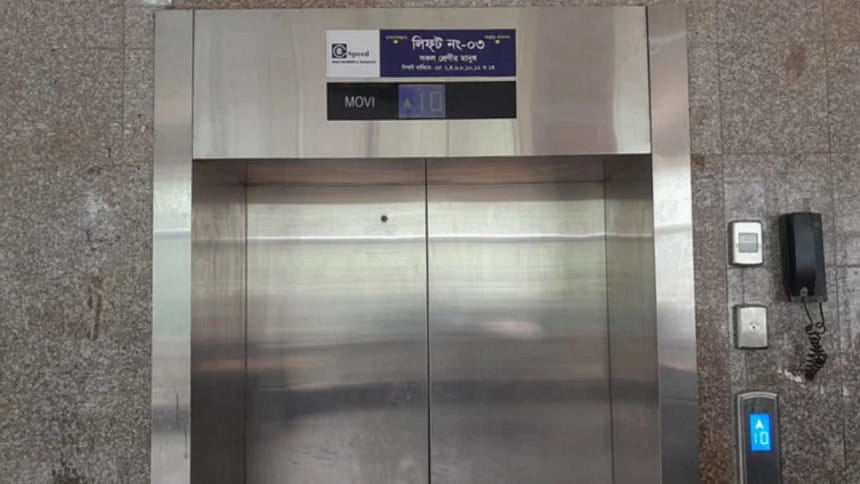The hospital can't deny responsibility

A patient died after being stuck in Gazipur's Shaheed Tajuddin Ahmed Medical College Hospital lift allegedly for "45 minutes" and the hospital authorities reacted not by expressing regret that such a preventable death occurred on its premises. Rather, in a letter to the Directorate General of Health Services, the authorities made every attempt to shun responsibility for the ill-fated death.
This kind of reaction from hospital authorities has become quite common in Bangladesh. Whenever a wrongful death occurs within hospital premises from negligence by medical professionals or mismanagement by the management, hospital authorities' stance is always defensive, not empathetic. Sometimes they even end up blaming the victims like the executive engineer and the director of Shaheed Tajuddin Ahmed Medical College Hospital did in their letter to the DGHS on May 12. They blamed the panicked people, stuck inside the lift, for disabling the Automatic Rescue Device (ARD) by pounding on the elevator door from inside. The ARD system automatically brings the lift to the nearest floor and opens the door in case of power outage or elevator malfunctions. According to the hospital authorities, the lift operator manually tried to bring the lift to a floor and open the door when the ARD did not work. But the people, stuck inside the lift, managed to open the door themselves before the liftman finished his job.
While it is debatable whether pounding on lift doors can disable the ARD, the hospital authority did not care to explain why there was no lift operator inside the elevator—someone who would know what to do in case of power failure or lift malfunction. Or why the hospital had such an elevator that would fail to operate properly if people, stuck inside, pounded the door inside? Should hospitals not install the sturdiest elevators? Instead of answering these questions, the hospital authorities made every attempt to prove the victims of the incident wrong. It is a clear indication of what might happen next. In the past, we have seen how, following such incidents, investigation committees are formed, certain time is taken to make the inquiry and then one or two lower-rank staff get reprimanded or lose their jobs. Progress of the inquiry or its findings hardly shows up in the news. We can also safely assume that no one from the top brass from any of these hospitals are held accountable, otherwise it would have made the headlines. Everything goes back to business as usual until another life is lost due to medical negligence or hospital mismanagement.
Only a week earlier on May 4, another patient died in this same hospital after falling through a gap between the floor and the wall on the 12th storey of the building. It is not clear why there was such an unsafe structural gap inside the building. There was no safety precaution installed on the floor either. A 70-year-old man fell through two floors and succumbed to his injuries. Our correspondent talked to the deceased family and learned that neither the postmortem nor the investigation report on the incident have been delivered yet. According to a Prothom Alo report, the hospital's director said that they had informed the LGRD about the gap, but nothing happened. This is yet another instance of shifting the blame and shunning responsibility. Why the hospital authority itself did not take any action to make that area on the 12th floor safe remains a mystery.
Questions like these pricked our conscience every time a child died after administration of general anaesthesia, or some other wrongful actions by a medical professional cost the life of a patient. Judging from the way patients are often mistreated in our hospitals either by hospital support staff or medical professionals, it feels that our healthcare services is less of a service and more of alms showered upon us out of pity. That we often have to pay through our nose to get any medical treatment at all is totally irrelevant. It is as if we should just accept every preventable death in our health system as a matter of fate and not expect any accountability from any quarters.
The sad reality is, had this death happened to a rich and powerful person, instead of Mumtaz Begum, from Kapasia's Barigao village, the consequence might have been different. Unfortunately, the negligence in our healthcare facilities do not touch the rich and powerful who run the country because they go for medical treatment elsewhere. So, at the end of the day, the people who should have been answerable for such preventable deaths remains out of touch. Even their conscience does not lead them to take any responsibility. Thus, commoner's life become expendable from yet another negligent incident.
Tamanna Khan is a member of the editorial team at The Daily Star.
Follow The Daily Star Opinion on Facebook for the latest opinions, commentaries and analyses by experts and professionals. To contribute your article or letter to The Daily Star Opinion, see our guidelines for submission.

 For all latest news, follow The Daily Star's Google News channel.
For all latest news, follow The Daily Star's Google News channel. 






Comments